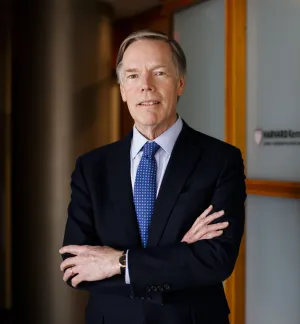By autumn of 1988, Mikhail Sergeyevich Gorbachev had been in power for three riveting years as general secretary of the Communist Party. He had taken his country and the world by storm since his elevation to the Soviet Union’s leadership ranks. Open, ebullient, reform-minded, and charismatic, Gorbachev had brought a new and refreshing style, as well as hope, to a people whose economy and self-confidence had deteriorated.
Across the rest of the globe, particularly in a still divided Europe, “Gorby,” as the press called him, was a rock star. Here was a Soviet leader who, more than anyone else on either side of the Cold War, had contributed to its thaw. Gorbachev and President Ronald Reagan had signed a landmark arms treaty and even dared to discuss at the Reykjavik Summit their mutual dream of a world without nuclear weapons. Gorbachev had also relaxed his nation’s longstanding iron control of its East European satellite states, resolving to let them find their own way to reform free of the threat of Soviet invasion. Gorbachev was one of the world’s most captivating figures as George H.W. Bush prepared to succeed Reagan as president.
But, just over three years later, the Soviet Union would collapse, dividing into 15 independent states. Gorbachev’s once promising economic reforms proved too tepid to save Soviet communism. His promotion of greater personal and social freedoms were just, but had made the country harder to govern. His liberal platform at home and campaign to lower Cold War tensions with the United States led the KGB, military, and party hardliners to overthrow him for three excruciating days in August 1991. And the man who saved him from the coup by launching a people’s revolt in Moscow, the Russian Republic leader, Boris Yeltsin, engineered his own revolt against Gorbachev and the Soviet empire two months later.
In “Gorbachev: His Life and Times,” William Taubman has written a fascinating, perceptive, and compelling account of the life of a brilliant, driven, but flawed leader who remains to this day, in the Amherst College professor’s eyes, a “tragic hero.” Taubman, who won a Pulitzer Prize for his 2003 biography of Nikita Khrushchev, once again displays his impressive grasp of the inner workings of the now vanished communist system that made the Soviet Union, for a half century, the most powerful and deadly foe of the West.
Bottom of Form
“Gorbachev’’ chronicles a life and career, at once, improbable and extraordinarily dramatic. The future Soviet leader came from a family of peasant farmers in the North Caucasus. One grandfather was imprisoned during Stalin’s purges of the 1930s. As a boy, Gorbachev watched his father march off to defend the USSR from Hitler’s brutal invasion that would cost more than 20 million Soviet lives. He also witnessed the harsh occupation of his own region by German troops. Surviving the war as a decorated combat veteran, his father, Sergei Gorbachev, whom the young boy idolized, teamed with his son on a combine harvester to become their region’s top grain-producing family. That feat earned the 17-year-old Gorbachev the coveted Red Banner of Labor, helping to catapult him to Moscow State University. Gorbachev was a star there and after as he quickly climbed the Communist Party ladder in his native Stavropol and eventually to Moscow as the brightest young star in the Politburo in 1978.
Gorbachev’s rise owed largely to his reputation as a new kind of leader with a powerful intellect and an abundance of self-confidence. He was also opportunistic, courting the favor of visiting Politburo officials vacationing in the rugged North Caucasus where Gorbachev worked for most of his first three decades in the Soviet system.
After the aging leaders Leonid Brezhnev, Yuri Andropov, and Konstanin Chernenko all died in rapid succession starting in 1982, a divided Politburo chose the young Gorbachev for the top post in 1985.
From the start, he made economic reform his top priority. Under the banner of “Perestroika,” or restructuring, he pushed to raise the standard of living for the country’s long-suffering population. But his effort stumbled due to outmoded infrastructure, falling productivity, alcoholism and, especially, excessive control by party apparatchiks in Moscow.
His other principal reform effort “Glasnost,” or openness, aimed to liberalize the nation’s authoritarian culture to allow greater personal freedoms and political and artistic expression. Taubman recounts how Gorbachev permitted publication of Anatoly Rybakov’s long banned anti-Stalin novel, “Children of the Arbat,’’ and the public showing of film director Tengiz Abuladze’s allegory of dictatorship, “Repentence.’’ And in his most celebrated signal of all, Gorbachev released the great physicist and human rights champion, Andrei Sakharov, and his wife, Elena Bonner, from internal exile.
He was no less committed to altering the Soviet Union’s Cold War against the West that had kept the two sides locked in a struggle for power in Europe and elsewhere for over four decades. From his first months in office, Gorbachev recognized that his country could not survive a prolonged, expensive arms race with the much wealthier United States. Another reason he became determined to seek peace involved the Chernobyl disaster of 1986, which taught him that no country could survive the catastrophe of nuclear war.
His “new thinking” first won over Britain’s hardline anti-communist leader, Margaret Thatcher, then US Secretary of State George Shultz, and finally Reagan himself. But, it was Reagan’s successor, Bush, with whom Gorbachev worked most successfully to bring the Cold War to a close.
In 1990, Gorbachev, Bush, and German Chancellor Helmut Kohl negotiated the unification of a German nation that had been divided since 1945. Later that year, Bush and Gorbachev joined forces to oppose Saddam Hussein’s illegal occupation of Kuwait. These two extraordinary diplomatic accomplishments testify to the newfound trust between the former rivals. By the time of the coup against Gorbachev the following year, Bush openly supported his return to power as Washington’s indispensable partner.
Why did Gorbachev fail in his quest to remake the Soviet system? First, Taubman notes, he was far from a perfect leader. Accused by some of vanity and arrogance, he never succeeded in winning over key figures in the Kremlin’s power structure. Second, he had the bad luck of the Chernobyl catastrophe and waited far too long to withdraw from the disastrous Afghan War. Third, those nationalities unjustly imprisoned in the Soviet Union such as the Estonians, Latvians, Lithuanians, and Ukrainians fought for and deserved their own independence. Most importantly, he never accepted that the only way to save his country was to quit the failing communist system instead of trying to fix it.
When the end came, it was bitter indeed. Gorbachev called Bush on Christmas morning 1991 as the hammer and sickle of the now collapsed union was about to be lowered from the Kremlin. As the White House note taker listening to that call from my home in Virginia, the tragedy of how Gorbachev’s reforms had failed and how he lost his country in the process was palpable to me and many others.
Since Gorbachev’s fall nearly 26 years ago, he has been a mostly reviled figure in his own homeland. Russian critics of the left and right blame him for what Vladimir Putin has called the greatest catastrophe of the 20th century — the fall of the once great Soviet Union. But, he is still feted abroad for his role in ending his nation’s deadly rivalry with the West.
Just as the legacy of American presidents wax and wane over time, Gorbachev may one day be rehabilitated in the judgment of his fellow Russians. A decade or more from now, Putin and his Soviet-trained generation of leaders will also pass from power. Perhaps then, Taubman concludes in this magisterial book, a younger generation might begin to appreciate anew the extraordinary optimism, hope, and courage that Gorbachev brought to the Kremlin three decades ago when he changed the world for the better.
GORBACHEV:
His Life and Times
By William Taubman
Norton, 880 pp.,
illlustrated, $39.95
Nicholas Burns is a Harvard professor and former US ambassador. He was an adviser to Presidents George H.W. Bush and Bill Clinton on Soviet and then Russian affairs at the National Security Council from 1990-1995.
Burns, Nicholas. “Gorbachev: a tragic hero.” The Boston Globe, September 24, 2017




